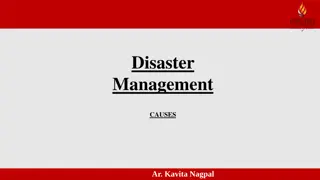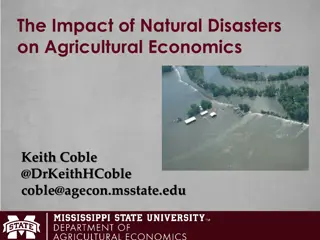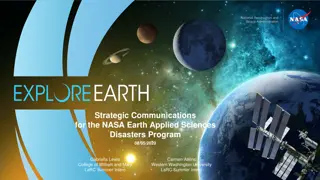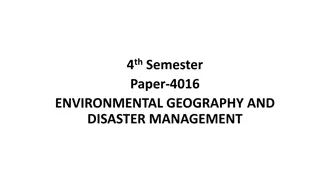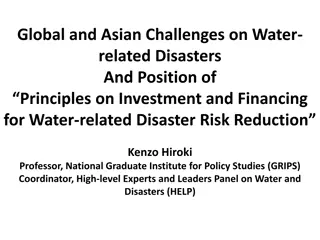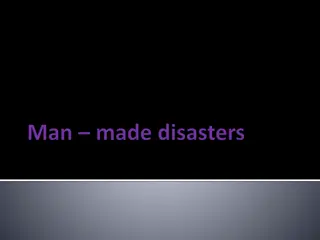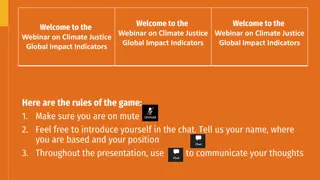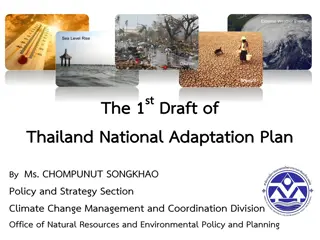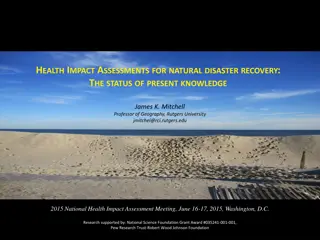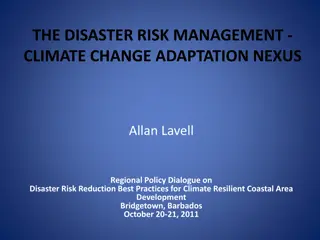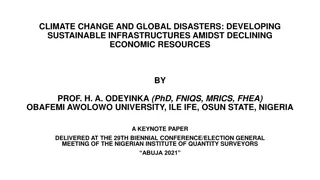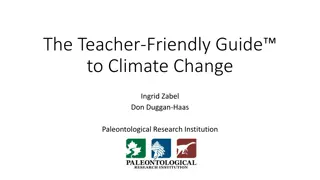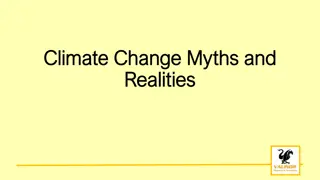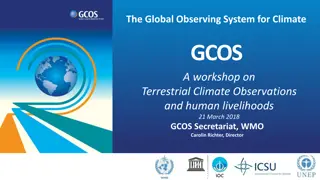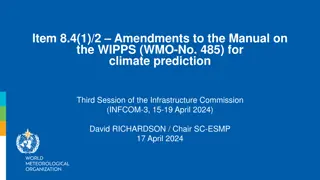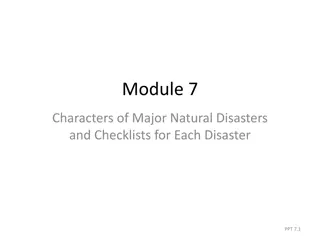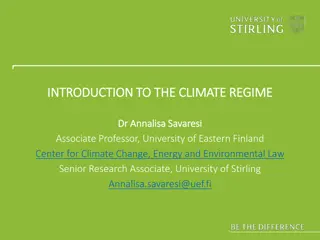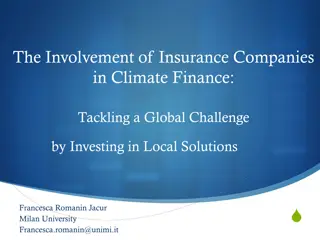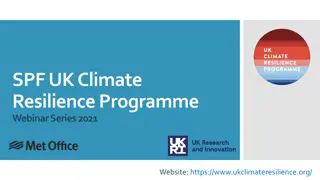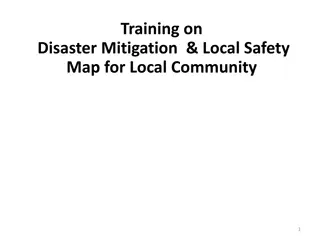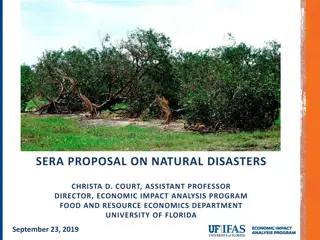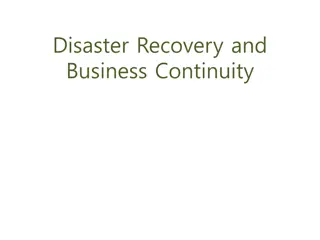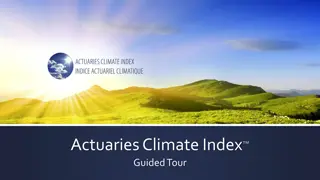Understanding Climate Change: Weather vs. Climate, Kppen-Geiger Classification, and Major Climate Zones
Explore the distinctions between weather and climate, delve into the Kppen-Geiger Climate Classification System, and discover major climate categories such as tropical climates. Gain insights into climate change and its impact on our environment.
8 views • 11 slides
National Climate Change Bill Overview
The National Climate Change Bill aims to establish an effective response to climate change in South Africa, promoting a transition to a low-carbon, climate-resilient economy. It focuses on coordinated actions, adaptive capacity enhancement, greenhouse gas management, and a fair global contribution.
8 views • 21 slides
Geospatial Comparison of Economic Change and Climate Disasters in Asia-Pacific
This study explores the impact of natural disasters on economic indicators in Southern and Western Asian countries over time, aiming to assist in policy-making by understanding the relationship between natural disasters and the economy. It discusses the increasing incidences of extreme weather event
4 views • 18 slides
Understanding the Relationship Between Intangible Cultural Heritage and Disaster Risk Reduction
This PowerPoint presentation by UNESCO explores the connection between Intangible Cultural Heritage (ICH) and Disaster Risk Reduction (DRR). It covers key concepts like disasters, risks, vulnerabilities, and resilience, emphasizing the importance of safeguarding and mobilizing ICH in the face of dis
7 views • 23 slides
Understanding Natural Disasters and Their Causes
Explore the various types of natural disasters such as meteorological, geophysical, hydrological, climatological, and biological events, each with unique causes like storms, earthquakes, floods, droughts, wildfires, and more. Learn how these disasters impact the environment and living organisms.
9 views • 16 slides
Regional Climate Modeling in CORDEX South Asia for Climate Change Research
This information details the regional climate modeling efforts within the CORDEX South Asia framework, focusing on high-resolution dynamical downscaling of CMIP5 climate projections. It highlights the activities, opportunities, and challenges for assessing regional climate change, along with future
4 views • 11 slides
Investment Responses to Biophysical Climate Impacts on Water, Energy, and Land in SDGs and Climate Policies
Investment assessments using Integrated Assessment Models (IAMs) are evolving to include biophysical climate impacts, assessing climate uncertainty on investments. The approach involves the MESSAGEix-GLOBIOM IAM, considering climate policy, SDG measures, and impacts under different scenarios. Climat
6 views • 32 slides
Gender-based Climate Change Litigation: A Key Solution?
Gender-based climate change litigation is emerging as a potential solution to address the disproportionate impact of climate change on different genders. Various international bodies have recognized the importance of integrating a gender-responsive approach in climate action to uphold human rights,
4 views • 12 slides
Understanding Psychological First Aid in Times of Disasters
Explore the psychological impact of disasters, learn the common reactions, and understand the core actions of Psychological First Aid (PFA). Discover how stress and disasters affect communities and individuals, common reactions to disaster stress, and when professional help may be needed.
0 views • 42 slides
Understanding Agricultural Risk Management in the Face of Natural Disasters
Exploring the impact of natural disasters on agricultural economics, this content delves into the challenges faced by farmers and the approaches available for managing risks. From analyzing the Billion-Dollar Disasters in the US to discussing private and public risk management provisions, the conten
3 views • 20 slides
Understanding Different Types of Disasters and Their Impact
Disasters, whether natural or man-made, can cause massive disruptions leading to human suffering, economic loss, and environmental damage. Natural disasters like earthquakes and cyclones, geological disasters such as volcanic eruptions, hydrological disasters like tsunamis, and climatological disast
0 views • 11 slides
Strategic Communications for NASA Earth Applied Sciences Disasters Program
NASA's Earth Applied Sciences Disasters Program aims to enhance disaster prediction, preparedness, response, and recovery through Earth observations. The program utilizes strategic communications to raise awareness about disaster impacts and the importance of NASA's work. It emphasizes the role of h
1 views • 14 slides
Understanding Chemical Disasters in the Indian Chemical Industry
Chemical disasters pose a significant threat to the Indian chemical industry, impacting human lives, property, and the environment. Factors contributing to these disasters include ageing process plants, human errors, design defects, and natural events. Proper prevention measures, such as hazard iden
0 views • 13 slides
Regional Project Proposal to Enhance Climate Resilience in Pakistan, Mongolia, and PRC
This proposal outlines a regional project focusing on enhancing climate resilience and agricultural productivity in Pakistan, Mongolia, and the People's Republic of China (PRC). The project aims to increase access to credit for smallholder farmers, promote climate-smart agriculture technologies, and
0 views • 12 slides
Challenges and Solutions in Water-Related Disasters
Exploring the global and Asian challenges posed by water-related disasters, this presentation by Kenzo Hiroki delves into the importance of investing in disaster risk reduction. Highlighting the increasing frequency and impact of natural disasters, particularly those related to water, the images and
0 views • 28 slides
Man-made Disasters: Short-term Events and Long-term Consequences
Man-made disasters come in two main forms: short-term events like oil spills or nuclear accidents, and long-term consequences such as climate change and loss of biodiversity. This article covers incidents like the Westgate Bridge Catastrophe in Melbourne and the Tasman Bridge Collapse in Hobart, hig
0 views • 24 slides
Personal Rights in European Climate Litigation
Climate litigation in Europe focuses on individual rights and the shortcomings of traditional governance mechanisms in addressing climate change. The emergence of climate litigation as a crucial tool in governance is driven by the need to protect individuals and specific groups who are disproportion
0 views • 17 slides
Analyzing Systemic Climate Risk in the Financial Sector
This study discusses systemic climate risk in the financial sector by examining the effects of climate risks on financial institutions. It aims to design a market-based framework to assess the vulnerability of financial institutions to climate risks and analyze potential contagion effects. The frame
0 views • 39 slides
Climate Justice Global Impact Indicators Webinar - June 2023
Explore the Climate Justice Theory of Change, key definitions, impact indicators, and the importance of climate-relevant decision-making in this informative webinar. Gain insights on climate adaptation, resilience, and the effects of climate change, all aimed at empowering marginalized communities t
0 views • 27 slides
Thailand National Adaptation Plan for Climate Resilience
Thailand's National Adaptation Plan focuses on building resilience to climate change impacts through strategic frameworks, guidelines, and financial allocation. It aims to integrate climate adaptation measures across sectors like water management, agriculture, tourism, public health, natural resourc
0 views • 14 slides
Health Impact Assessments for Natural Disaster Recovery
The study examines the status of knowledge related to health impact assessments for natural disaster recovery, emphasizing the importance of considering the long-term health impacts of disasters. It highlights how disasters and recovery actions can have lasting consequences on community health and w
0 views • 10 slides
National Priorities for Climate Change Science and Knowledge in Canada
Canadians are experiencing firsthand the impacts of climate change, including wildfires, heatwaves, floods, hurricanes, and droughts. To address these challenges, foundational climate change science and knowledge are essential for understanding our changing environment, identifying impacts, making i
0 views • 9 slides
Disaster Risk Management and Climate Change Nexus in Caribbean Region
The Caribbean region faces critical challenges due to the intersection of disaster risk management and climate change, with annual hydro-meteorological disasters on the rise. Countries like Haiti, Cuba, and Puerto Rico are experiencing increasing disaster impacts, urging immediate attention to clima
0 views • 20 slides
Developing Sustainable Infrastructures Amid Climate Change and Global Disasters
Prof. H.A. Odeyinka's keynote paper discusses the importance of developing sustainable infrastructures amidst declining economic resources in the face of climate change and global disasters. It highlights the concepts of climate change, sustainable development, atmospheric layers, ozone layer, carbo
0 views • 25 slides
Understanding Climate and Its Impact on Earth
Exploring the fundamentals of climate, this comprehensive guide covers topics such as climate zones, climate formation, atmospheric composition, the role of CO2, ocean heat absorption, and circulation patterns. From the basics of weather and seasons to the significant impact of climate change, learn
0 views • 12 slides
The Teacher-Friendly Guide to Climate Change
The Teacher-Friendly Guide to Climate Change authored by Ingrid Zabel, Don Duggan-Haas, Robert Ross, and others explores topics such as climate measurement, natural causes of climate change, historical climate perspectives, and more. It delves into the significance of understanding past climates to
1 views • 12 slides
Climate Change Myths and Realities: Debunking Common Misconceptions
This content discusses common myths surrounding climate change and provides evidence-backed realities to debunk them. Topics include the pause in warming, natural climate variability, misconceptions about climate models, the impact of CO2 on plant life, and the consensus among climate scientists. Th
0 views • 6 slides
The Global Observing System for Climate and Terrestrial Climate Observations
The Global Observing System for Climate (GCOS) plays a crucial role in observing climate-related variables globally. Established in April 1992, GCOS focuses on what, how, and where to measure, sustain measurement, manage change, data transmission, management, rescue, and access. It addresses concern
0 views • 17 slides
Amendments to WIPPS Manual for Climate Prediction at INFCOM-3, April 2024
The document discusses amendments to the Manual on WIPPS for climate prediction, including new recommendations for weather, climate, water, and environmental prediction activities. It introduces concepts such as Global Climate Reanalysis and the coordination of multi-model ensembles for sub-seasonal
0 views • 10 slides
Exploring Natural Disasters and Environmental Impact
Dive into the exhibition "Ecology" that sheds light on major natural disasters, their effects on the environment and animals, and the importance of protecting our surroundings. Learn about surviving disasters, including tornadoes, and historical events like the North Korean March of Suffering. Disco
0 views • 31 slides
Climate Change Litigation in Aotearoa/New Zealand: LCANZI Action and Judicial Review
The Lawyers for Climate Action NZ Incorporated (LCANZI) are actively involved in climate change litigation in Aotearoa/New Zealand, including challenging government decisions related to climate responses. A notable case involved a judicial review against Auckland Transport, where the High Court refu
0 views • 6 slides
Comprehensive Training Module on Natural Disaster Preparedness
In this comprehensive training module, participants will learn about various natural disasters, their causes, and characteristics. They will also be equipped with the necessary knowledge to prepare emergency procedures checklists tailored to different types of disasters. The module covers a range of
0 views • 52 slides
Understanding Weather and Climate Factors
Weather and climate are essential aspects of understanding the Earth's atmosphere. Weather refers to short-term atmospheric conditions, while climate represents long-term averages over 30 years. Factors influencing climate include distance from the equator, altitude, proximity to the sea, wind direc
0 views • 10 slides
Understanding the International Climate Regime and Governance
In this comprehensive overview, Dr. Annalisa Savaresi delves into the intricacies of the international climate regime, highlighting key aspects such as international climate law, major climate conferences like COP26, and the evolution of climate governance. The discussion covers important agreements
0 views • 27 slides
The Role of Insurance Companies in Climate Finance: Addressing Global Challenges through Local Investments
Exploring the engagement of insurance companies in climate finance, this presentation highlights the significance of private sector involvement in tackling climate change at a local level. It delves into key concepts such as mitigation, adaptation, and the global scientific targets for combating cli
0 views • 11 slides
UK Climate Resilience Programme Webinar Series 2021
The UK Climate Resilience Programme is hosting a webinar series featuring experts discussing climate resilience, adaptation strategies, and socio-economic pathways for the UK. Attendees can engage in presentations, Q&A sessions, and access recorded content post-event. Learn about the latest developm
0 views • 10 slides
Disaster Mitigation & Local Safety Training for Nepali Communities
This training program focuses on understanding disaster risks, particularly earthquakes, in Nepal. It covers topics such as the geographical structure of Nepal, responding to earthquake disasters, local safety mapping, types of disasters (natural and man-made), major disasters in Nepal, and historic
0 views • 26 slides
Understanding the Economic Impact of Natural Disasters on Agriculture
Natural disasters in the United States have led to significant economic losses, with Florida alone experiencing billions in damages annually. The SERA Proposal focuses on assessing vulnerabilities, enhancing system resilience, and utilizing state-of-the-art tools for disaster impact assessment, espe
0 views • 31 slides
Importance of Disaster Recovery and Business Continuity Planning
Disaster recovery and business continuity planning are crucial for businesses to survive major disasters and continue operations. This involves assessing business impacts, creating documentation, and planning for various types of disasters. Failure to plan can lead to significant revenue loss, damag
0 views • 46 slides
Understanding the Actuaries Climate Index: A Comprehensive Guide
The Actuaries Climate Index (ACI) is an essential tool that measures climate risks using historical data collected since 1961. It focuses on extreme climate events and sea level changes, providing valuable insights into the impacts of climate change. By analyzing the ACI and its components, users ca
0 views • 18 slides




